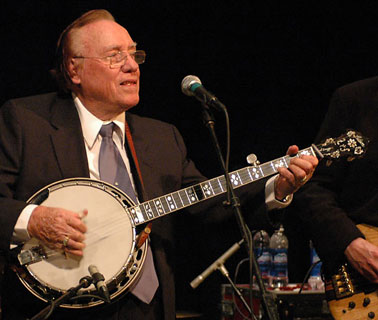Bluegrass Legend Earl Scruggs of Flatt & Scruggs Dies in Nashville at Age 88

Banjo pioneer and bluegrass legend Earl Scruggs, who popularized a complex, three-fingered style of playing banjo that transformed the instrument forever, died of natural causes Wednesday morning at a hospital in Nashville, according to his son, Gary. He was 88.
Scruggs' use of three fingers rather than the typical "clawhammer" style took the banjo from the background to the foreground, making it a lead instrument -- and not just a prop for comedians.
His string-bending and lightning-fast and lead runs became known as "the Scruggs picking style." Although Scruggs didn't invent the technique, which involves striking the strings with three right-hand fingers, he perfected and popularized it.
Although he rose to prominence through his work with Bill Monroe in the 1940s, he is perhaps best remembered as half of Flatt & Scruggs, the duo he formed with traditional bluegrass guitarist Lester Flatt. The duo formed after Flatt and Scruggs left Monroe's band in the late 1940s. They broke up in 1969 over a disagreement about whether their music should experiment or stick to tradition.
"It wasn't a bad feeling toward each other as much as it was that I felt I was depriving myself of something," Scruggs said in a 2010 interview. "By that, I mean that I love bluegrass music, and I still like to play it, but I do like to mix in some other music for my own personal satisfaction, because if I don't, I can get a little bogged down and a little depressed."
Flatt & Scruggs were best known for their 1949 song "Foggy Mountain Breakdown," which can be heard in the 1967 film Bonnie and Clyde, and "The Ballad of Jed Clampett" from The Beverly Hillbillies, the 1960s TV show (That was Jerry Scoggins on vocals).
Flatt died in 1979.
Get The Pick Newsletter
All the latest guitar news, interviews, lessons, reviews, deals and more, direct to your inbox!
Scruggs was born January 6, 1924, in Flint Hill, North Carolina, and learned to play banjo when he was 4. He appeared on radio at age 11 and was playing in bluegrass bands by 15. He came to popular attention in 1945 when he joined Bill Monroe's Blue Grass Boys on the Grand Ole Opry. His first performance with the Blue Grass Boys, on December 8, 1945, is still considered the "Big Bang of Bluegrass," offering a template — guitar, mandolin, upright bass, fiddle and Scruggs-style banjo — that is still employed today.
"My music came up from the soil of North Carolina," Scruggs said in 1996 when he was honored with a heritage award from North Carolina.
His wife of 57 years, Louise Scruggs, died in 2006. He is survived by two sons, Gary and Randy.

Damian is Editor-in-Chief of Guitar World magazine. In past lives, he was GW’s managing editor and online managing editor. He's written liner notes for major-label releases, including Stevie Ray Vaughan's 'The Complete Epic Recordings Collection' (Sony Legacy) and has interviewed everyone from Yngwie Malmsteen to Kevin Bacon (with a few memorable Eric Clapton chats thrown into the mix). Damian, a former member of Brooklyn's The Gas House Gorillas, was the sole guitarist in Mister Neutron, a trio that toured the U.S. and released three albums. He now plays in two NYC-area bands.
“The rest of the world didn't know that the world's greatest guitarist was playing a weekend gig at this place in Chelmsford”: The Aristocrats' Bryan Beller recalls the moment he met Guthrie Govan and formed a new kind of supergroup
Carlos Santana hospitalized following pre-show medical emergency









